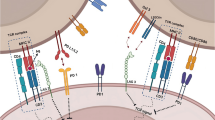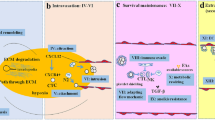Abstract
Cancer immunoediting consists of three sequential phases: elimination, equilibrium, and escape. For colorectal adenoma-carcinoma sequence, the adenoma dysplastic progression may represent an equilibrium phase and the cancer stage as escape phase. Immune system eliminates transformed enterocytes by destroying them at first, sculpts them at the same time and selects the variants subsequently that are no longer recognized and insensitive to immune effectors, and finally induces immunosuppressive state within the tumor microenvironment that facilitates immune escape and tumor outgrowth. Immunosuppression and inflammation are the two crucial features of Pi (Spleen)-deficiency. Classic quotations, immune evidence and clinical observations suggest that Spleen (but not other organs) deficiency is the key pathogenesis of colorectal cancer (CRC) microenvironment. Weakness of old age, immunosuppressive cytokines from chronic inflammation, tumor-derived immunosuppressive factors and surrendered immune cells—regulatory T cells, myeloid-derived suppressor cells and tumor associated macrophages (TAMs) constitutes CRC microenvironment of Pi-deficiency. Furthermore, excess in superficiality, such as phlegm stagnation, blood stasis and toxin accumulation are induced by chronic inflammation on the basis of asthenia in origin, an immunosuppressive state. Great masters of Chinese medicine emphasize that strengthen Pi is the chief therapeutic principle for CRC which receives good therapeutic effects. So, Pi-deficiency based syndrome is the pivotal pathogenesis of tumor microenvironment. The immunosuppressive microenvironment facilitates immune escape which play an important role in the transition from adenoma to adenocarcinoma. There are some signs that strengthen Pi based treatment has potential capacity to ameliorate tumor environment. It might be a novel starting point to explore the mechanism of strengthen Pi based therapy in the prevention and treatment of CRC through regulation of tumor environment and immunoediting.
Similar content being viewed by others
References
Ferlay J, Shin HR, Bray F, Forman D, Mathers C, Parkin DM. Estimates of worldwide burden of cancer in 2008: GLOBOCAN 2008. Int J Cancer 2010;127:2893–2917.
Compton CC, Fielding LP, Burgart LJ, Conley B, Cooper HS, Hamilton SR, et al. Prognostic factors in colorectal cancer. College of American Pathologists Consensus Statement 1999. Arch Pathol Lab Med 2000;124:979–994.
Han QR, Fu XQ, Yu ZL, Sun XG. Discussion on Pidefi ciency nature of tumor microenvironment. J Tradit Chin Med 2014;55:292–294, 298.
Prendergast GC, Jaffee EM, eds. 1st ed. Cancer immunotherapy: immune suppression and tumor growth. Burlington: Academic Press;2007:1–97.
Mantovani A. Cancer: inflaming metastasis. Nature 2009;457:36–37.
Grizzi F, Bianchi P, Malesci A, Laghi L. Prognostic value of innate and adaptive immunity in colorectal cancer. World J Gastroenterol 2013;19:174–184.
Lu H, Ouyang W, Huang C. Inflammation, a key event in cancer development. Mol Cancer Res 2006;4:221–233.
Sillars-Hardebol AH, Carvalho B, van Engeland M, Fijneman RJ, Meijer GA. The adenoma hunt in colorectal cancer screening: defi ning the target. J Pathol 2012;226:1–6.
Peddareddigari VG, Wang D, Dubois RN. The tumor microenvironment in colorectal carcinogenesis. Cancer Microenviron 2010;3:149–166.
Schreiber RD, Old LJ, Smyth MJ. Cancer immunoediting: integrating immunity's roles in cancer suppression and promotion. Science 2011;331:1565–1570.
Zamarron BF, Chen W. Dual roles of immune cells and their factors in cancer development and progression. Int J Biol Sci 2011;7:651–658.
Ellebaek E, Andersen MH, Svane IM, Straten PT. Immunotherapy for metastatic colorectal cancer: present status and new options. Scand J Gastroenterol 2012;47:315–324.
Li ST, Chi P. Evolution of the management of colorectal cancer using integrative medicine. Chin J Integr Med 2011;17:73–79.
Li J, Lin HS, Wang XT, Zhang YR. The molecular mechanism of traditional Chinese medicine re-sculpture effect on the process of tumor immunoediting. World Sci Technol/Modern Tradit Chin Med Mater Medic (Chin) 2009;11:747–752.
Zhao GX, Zheng J, Gu Y, Zhu YJ. Colorectal cancer syndrome analysis of the literature. J Liaoning Univ Tradit Chin Med (Chin) 2009;11:72–74.
Deng Z, Sun J. Literature study on colorectal cancer syndrome differentiation. J Yunnan Univ Tradit Chin Med (Chin) 2011;34:54–56.
Wang X, Zhang H, Yuan X, Gao L, Li P. Study on traditional Chinese medicine syndrome and pathogenesis of colorectal cancer based on modern literatures. J Emerg Tradit Chin Med (Chin) 2009;18:1859–1861.
Zhou H, Shen K. Clinical study on "Weichangan" in treating postoperative colorectal carcinoma of Spleen deficiency. Shanghai J Tradit Chin Med (Chin) 2009;43:36–38.
Han L, Pan YF, Huang CJ, Ding H, Huang JP, Tang XF, et al. Clinical observation of "Jianpi Qingchang Decoction" on postoperation of colorectal cancer of Spleen defi ciency and damp heat pattern. Shanghai J Tradit Chin Med (Chin) 2012;46:42–44.
Liu JL, Yao LQ, Nie LA. Immunological study on rats with large intestine cancer of Shuganjianpi treatment Liver depression and Spleen deficiency. Int Med Health Guid News (Chin) 2006;12:4–6.
Chen Z, Chen LY, Wang P, Dai HY, Gao S, Wang K. Tumor microenvironment varies under different TCM Zheng models and correlates with treatment response to herbal medicine. Evid Based Complement Alternat Med 2012;2012:1–10.
Yao L, Nie L, Zhan B, Li X. The effects of Liver depression and Spleen defi ciency on the immune function in colorectal cancer rats induced by DMH. J Chin Physic (Chin) 2005;7:1205–1207.
Kanterman J, Sade-Feldman M, Baniyash M. New insights into chronic inflammation-induced immunosuppression. Semin Cancer Biol 2012;22:307–318.
Tao Z, Zhou D, Chen L, Chen Y, Chen X. Experimental research of Shenqi Guben Recipe for the treatment of Lewis lung cancer mice with Spleen-deficiency. J Guangzhou Univ Tradit Chin Med (Chin) 2008;25:56–59.
Qian ZN, Qian HN. Review of concerning mechanisms between Spleen defi ciency syndrome and neuronendocrine immunomodulation. Liaoning J Tradit Chin Med (Chin) 2010;37:401–403.
Zheng LY, Yang LL, Li LR, Jing HR, Wang J, Wang QF, et al. Expressions of TNF-alpha, IL-6, CRP, and MCP-1 in phlegmdamp constitution population detected by multiplexed Luminex assay. Chin J Integr Tradit West Med (Chin) 2013;33:920–923.
Zhang CA, Wei PK, Li YJ. Discussion of the correlation between phlegm and tumor microenvironment. J Chin Integr Med (Chin) 2010;8:215–219.
Shi B, Yuan XX, Qin ZF, Wei PK. Discussion on phlegm stagnation and tumorigenesis. China J Tradit Chin Med Pharm (Chin) 2012;27:2389–2393.
Lima LG, Monteiro RQ. Activation of blood coagulation in cancer: implications for tumor progression. Biosci Rep 2013;33:701–710.
Chen Z, Wang P. Clinical distribution and molecular basis of traditional Chinese medicine Zheng in cancer. Evid Based Complement Alternat Med 2012;2012:1–8.
Chen MX, Zhang H, eds. Tamor—Serial books on clinical records of special diseases and great masters. 1st ed. Changsha: Hunan Science and Technology Press; 2011:180, 295, 350, 369.
Bodeker G. Integrative oncology meets immunotherapy: new prospects for combination therapy grounded in Eastern medical knowledge. Chin J Integr Med 2012;18:652–662.
Deng QX, Peng C, Ao H, Xie XF. Effect of Shenzhu Capsules on T activation signals of Spleen-defi cient gastric cancer mice. Chin Pharmacol Bull (Chin) 2012;28:737–738.
Wang JH. Traditional Chinese medicine and the positive correlation with homeostatic evolution of human being: based on medical perspective. Chin J Integr Med 2012;18:629–634.
Author information
Authors and Affiliations
Corresponding author
Additional information
Supported by the National Natural Science Foundation of China (No. 81273621), Guangdong Natural Science Foundation of China (No. 2014A030313323)
Rights and permissions
About this article
Cite this article
Sun, Xg., Lin, Xc., Diao, Jx. et al. Pi (Spleen)-deficiency syndrome in tumor microenvironment is the pivotal pathogenesis of colorectal cancer immune escape. Chin. J. Integr. Med. 22, 789–794 (2016). https://doi.org/10.1007/s11655-015-2086-5
Received:
Published:
Issue Date:
DOI: https://doi.org/10.1007/s11655-015-2086-5




